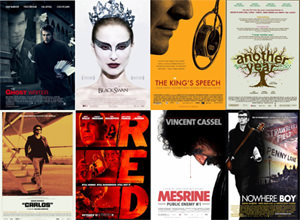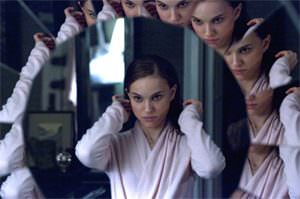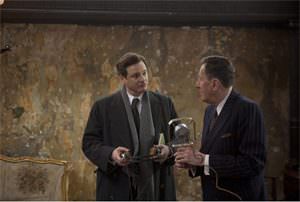2010: Best of the Big Screen
I don’t know when the practice began or who had the initial brainstorm, but it is now written in fiery letters that at the end of every year that movie reviewers must set aside the really fun stuff and spend a day or two tripping down short-term memory lane to concoct a list of the year’s 10 best movies.I’ve always wanted to say the hell with it and just compose a list of the movies that I really like and think may have a chance of outliving, for a few years, the year they came out.
I don’t know when the practice began or who had the initial brainstorm, but it is now written in fiery letters that at the end of every year that movie reviewers must set aside the really fun stuff—shopping, decorating the front of the house with blinking lights, fighting with their spouses about the placement and decoration of the tree—and spend a day or two tripping down short-term memory lane to concoct a list of the year’s 10 best movies. It is a habit that now extends to all the other expressive forms—books, television, music, theater—but it began with the movies.
I suppose it’s a harmless enough activity—except for its arbitrary quality. I mean, who decreed that we should have to choose 10—and only 10—movies for our lists? It is theoretically possible, if unlikely, that some years we might want to honor 11 or 12 films for our lists. It is much more likely that we will be straining to come up with 10 really good movies per year.
I’ve always wanted to say the hell with it and just compose a list of the movies that I really like and think may have a chance of outliving, for a few years, the year they came out. Thanks to the tolerance and good nature of Truthdig’s editors, that’s what I’m about to do. Here they are, in subjectivity’s rough order:
1. “The King’s Speech”: Bertie (Colin Firth), second in line for the job, was not meant to be England’s monarch, so his stammer was not of much consequence—until his brother David got involved with Wallis Warfield Simpson, the grim divorcee, who for that quaint reason could not be queen. That means that her twit paramour didn’t feel like being king. Now, suddenly, his younger brother’s speech impediment matters a great deal—he has to become the spokesman for a nation entering World War II.
Encouraged by his wife (the charmingly perky Helena Bonham Carter), he grudgingly goes to work with a cheeky and eccentric speech therapist, Lionel Logue (a superb Geoffrey Rush), with Tom Hooper’s film (written by David Seidler) tracing the relationship’s development with wit, passion and elegance. Firth’s performance as the man who would become George VI is wondrously subtle—he’s a kindly, stuffy man who is—all unknown to him—just waiting to get unstuffed. He’s an unlikely heroic figure in a highly unlikely movie. But neither Firth nor the movie stresses oddity. There’s something almost homey about the movie as it lets us discover its best qualities slowly, which quietly ensures our passionate involvement with these disparate men as we observe a true and lifelong friendship developing between them. Stylistically the filmmaking is very traditional, but that also works to the movie’s advantage—highlighting the curiosity of this relationship and, incidentally, the way they managed to subvert the class system as it worked in England not so very long ago.
2. “Another Year”: Tom (Jim Broadbent) and Gerri (Ruth Sheen) drive a Volvo, grow their own vegetables and lead quiet, useful lives—snug as bugs in a rug. This is middle age as ’60s activists dreamily imagined it might be. Their friend Mary (Leslie Manville, in the great female performance of the year), is their nightmare alternative—lonely, man-crazy, hard-drinking and the pest seemingly put on earth to torment their placidity. Out of these modest materials writer-director Mike Leigh has fashioned another in his increasingly impressive series about the miseries of middle class English life. Nothing really out of the ordinary happens in these films; people fall in and out of love, get married and generally try to keep up appearances. Sometimes death touches them, but with not too heavy a hand. What dramatically animates a story such as “Another Year” is the largely unacknowledged lies that sustain these lives, tamping down the desperation that only Mary manifests. OK, it’s a chamber piece—but a subtle and haunting one.
3. “Mesrine”: Two French films, running between four and five hours apiece, each portraying the life of a decidedly anti-social character, were released this year in the United States. One, “Carlos,” recounted the life of “The Jackal,” the formerly notorious terrorist, the other, “Mesrine,” is about a cheeky and prolific bank robber who operated in roughly the same era. The former received more—and more enthusiastic—critical attention here, doubtless because Carlos himself achieved more international notoriety. But the life of Jacques Mesrine, whose fame was pretty much confined to France, provides the basis for a much better film, partly because there is no quasi-political justification for his depredations, and partly because Vincent Cassel gives such a wild and gripping performance in the title role. In the annals of movie anarchists he achieves, I think, an unmatched level of psychopathy, which the director, Jean-Francois Richet, never deigns to explain or justify. Mesrine, the product of a bourgeois background, is a tireless bundle of anti-social activity who eventually derives what job satisfaction he can from the glamorized image of himself the French press is only too happy to propagate. Carlos declines into fat and irrelevance, which the movie spends far too much time detailing. Mesrine, on the other hand, goes out snarling, with the movie spending almost as much time on the fate of a dog wounded in his final shootout with the cops as it does on the criminal’s demise. Tres French. Tres wonderful. 4. “Nowhere Boy”: Before he was a Beatle, John Lennon was just an ordinarily feckless teenager—but with an asterisk that makes all the difference. For he was being raised by a stern and seemingly unyielding aunt, beautifully played in this movie by Kristin Scott Thomas, though his careless, carefree mother (Anne-Marie Duff) lives just a few blocks away. She is thought to be an unfit mom, though Lennon (Aaron Johnson) doesn’t quite see it that way. She offers him what adult fun is available to him — and, not incidentally, provides him with his first stringed instrument (a banjo), which leads to a guitar, garage bands, songwriting and eventually the means to rewrite pop music history. The two women provide the formative tension this life—and this movie—requires. The director, Sam Taylor-Wood, totally avoids portentous foreshadowing in this odd and curiously charming film, in which Lennon eventually embraces the discipline his aunt exemplifies without totally rejecting his mother’s cheerful good nature. “Nowhere Boy” is that rare thing—a biopic that refuses to get carried away with itself or its subject. It is a beautifully poised little film, and, one might dare to hope, a model for telling lives that other moviemakers might aspire to follow.
5. “Mother and Child”: I don’t know, this may be only the best Annette Bening movie of the year (I found “The Kids Are All Right” unbearably smug), but I suspect (or hope) that it’s more than that. It recounts the lives of a mother who gives up an unwanted baby for adoption and the adult life of that child (Naomi Watts) as a chilly, emotionally detached lawyer who eventually must confront the same childbearing decision her mother did. The two never meet in later life, but the writer-director, Rodrigo Garcia, maintains an admirable tough-minded stance in recounting this emotionally complicated story, which includes the slow, but plausible, warming of Bening’s character and a parallel failure of her daughter to find a fully humane path in life. He does arrange an ending that could be described as hopeful in a pinch but does not damage the overall tone of the movie. This is essentially a reserved, even cold film, which, of course, doomed it commercially, but sets it apart from the mainstream of domestic dramas. Its uncompromised sobriety extends to all its actors and makes it a movie well worth seeking out—difficult as that task may be.
6. “Red”: It’s the not totally disagreeable custom of 10 Besting for the writer to climb down off his high critical horse and confess to liking some totally silly—but not totally stupid–lowbrow movie. This year the winner in that category—there’s no competition, really—is this film, in which, for reasons I don’t completely recall, Bruce Willis, a retired CIA agent, must reassemble his old team of assassins to ward off an attack on him by mysteriously motivated killers from the agency. His team includes the wonderfully daft John Malkovich, a genteel Helen Mirren, an expert with assault weapons, and the always sly and agreeable Morgan Freeman, with Mary-Louise Parker as the innocent along for the ride. It’s a marvelously energetic ride, marked by director Robert Schwentke’s relentlessly paced direction and an endlessly amusing string of tense incidents and smart wisecracks from the writers, Jon Hoeber and Erich Hoeber. “Red” unashamedly embraces action-comedy conventions, twists them amusingly, and never once acts snooty about them. These guys are out for a good time, and that’s what they delightfully provide us.
And there you have it. A half dozen will have to do. If I’d felt like stretching a point, I might have cited “City Island.” And I liked one, but not all, of the Stieg Larsson adaptations from Sweden. “Hereafter” was an intelligent and romantic movie about a topic—the afterlife—that people couldn’t seem to accept as a subject appropriate for Clint Eastwood. And “The Ghost Writer” was intelligent entertainment. That said, somehow it seems more useful to fire off a couple of warning shots about movies that are currently in release. For example, “Somewhere,” which received some rather good reviews but is all L.A. anomie—languid, feckless and faux artless. That stands in contrast to “Black Swan,” which is pretentiously artful, about a young ballerina eventually willing to die trying to dance a perfect “Swan Lake.” Natalie Portman plays the dancer with great intensity and Vincent Cassel, of all people, turns up as her choreographer and would-be lover—and a mere shadow of Mesrine.
Your support matters…Independent journalism is under threat and overshadowed by heavily funded mainstream media.
You can help level the playing field. Become a member.
Your tax-deductible contribution keeps us digging beneath the headlines to give you thought-provoking, investigative reporting and analysis that unearths what's really happening- without compromise.
Give today to support our courageous, independent journalists.





You need to be a supporter to comment.
There are currently no responses to this article.
Be the first to respond.